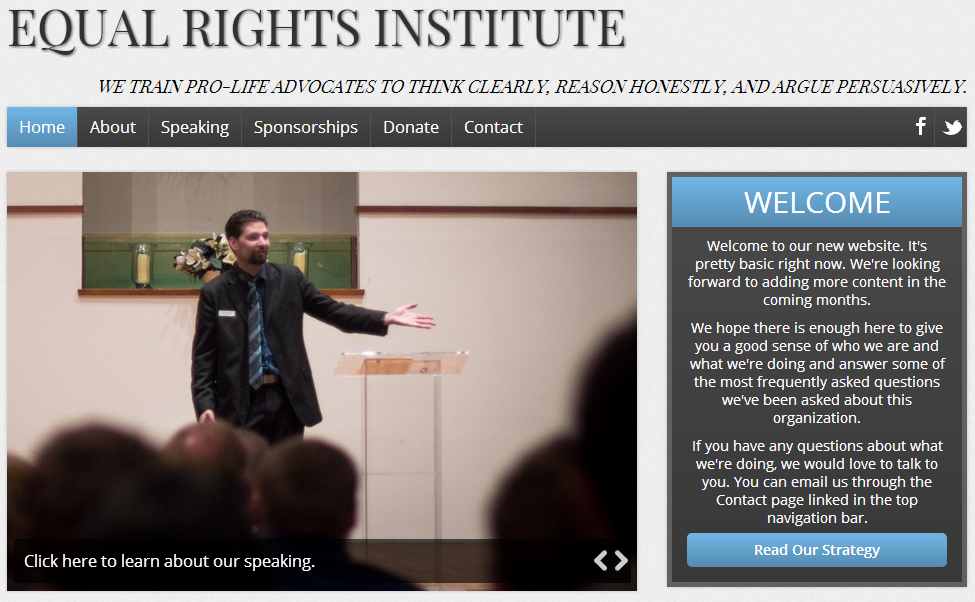Introducing the Equal Rights Institute
think of “the pro-life movement,” who do you picture? Do you think of a massive
crowd with homemade picket signs shuffling through Washington DC in the snow
(or San Francisco in the sun)? Do you imagine an elderly lady standing outside an abortion clinic handing out pregnancy resource pamphlets? Maybe the phrase “pro-life
movement” brings to mind a politician using a lot of the same old buzzwords, or
the guy your campus group hosted for a formal debate last year, or even your
friend who is an adoption counselor.
of who comes to mind for you, when you think “pro-life movement,” you think of someone, right? But wouldn’t it be great
if the phrase “pro-life movement” made you think of everyone?
to create a society where everyone is pro-life. Because we’re secularists, we
focus particularly on religious diversity. But we are happy to grow the
pro-life movement in other dimensions too; we want everyone—people of every age, gender, race, religion, sexuality, and
political affiliation—to be pro-life.
 |
| You know, like this, except not so “cheesy stock photo.” |
inclusive is difficult. Any time you throw a bunch of people with such varied
backgrounds into a mix, there’s friction. Even if we’re all against abortion,
other aspects of our lives are very different. We have diverging, sometimes opposing,
perspectives on topics outside the abortion debate—topics that are also
important to us. If we don’t make a proactive effort to understand one another
(maybe not agree with, but understand), how can we unite?
major hurdle the pro-life movement needs to overcome, and that priority is why
I am so thrilled to have met and befriended Josh Brahm.
to say his job is to help pro-lifers not be weird. Really his job is to train pro-lifers
to think clearly, reason honestly, and argue persuasively. That means he gives
talks and speeches and leads (or helps lead) training seminars for pro-lifers.
What does he talk about and train others on? Relational apologetics. Josh believes
(and I think he’s absolutely right) that we sway the most hearts and minds when
we take each person as an individual, and we learn how to effectively relate to
people.
recently, Josh did most of his work as either part of the Right to Life of Central
California (RTLCC) or in conjunction with Justice For All (JFA). (In fact, only
a couple months ago I wrote some blog posts about attending one of Josh’s JFA
trainings. Ellen, a pro-life atheist, and I were very impressed with Josh’s effort to include us, as secularists, in the training. He’s just a very inclusive kind
of guy.)
and RTLCC did some great work together, but it’s time for a change. Last week,
Josh announced that he’s founding his own organization: the Equal Rights
Institute (ERI).
 |
| The ERI website will be live by July 1st! |
Josh is a Christian who works to relate to secularists. He’s a straight guy who works to relate to homosexuals. He’s a pro-lifer who works to relate to pro-choicers. He doesn’t just talk about how we should all get along; he actually gets along with a wide variety of people. I find that inspiring and encouraging.
Now go!

This is really exciting!
I've read a lot of Josh's work and have generally been very impressed with it. I wish him the best in this, and any other endeavors in which he engages.
Excited for the work you guys and Josh are doing. I've been saying for years (but not acting much) the pro-life movement needs to get beyond God arguments and prayers outside clinics. It becomes too easy for pro-choicers and the media to dismiss as religious nutjobs.
"Josh is a Christian who works to relate to secularists. He's a straight guy who works to relate to homosexuals. He's a pro-lifer who works to relate to pro-choicers. He doesn't just talk about how we should all get along; he actually gets along with a wide variety of people. I find that inspiring and encouraging."
This is exactly the type of relevance I had in mind too. I think that Josh Brahm has the right idea and I think his new organization will succeed where others have failed for over 40 years.